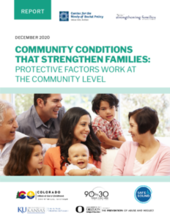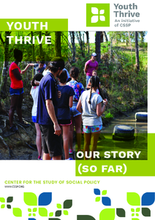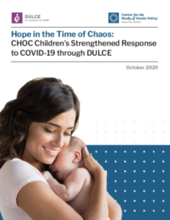Displaying 31 - 40 of 437
By drawing on the experiences of parents, advocates, NGOs, and public officials, this side event invited discussion on how, through strengthening families and tools for prevention, societies can reduce the number of children being institutionalized. During the event, a panel of experts from the Republic of Moldova, South Africa, Burkina Faso, Vietnam, and the United States explored their experiences around efforts to empower parents and keep children with disabilities with their families.
This report summarizes survey findings from organizational partners and members of the Strengthening Families National Network interested in using the Protective Factors Framework in their community-level approach and their viewpoints on community conditions that support child and family outcomes.
This paper reports on the results of an online survey of P2P stakeholders regarding: How text‐based support is being used in P2P programs and whether text‐based support is perceived as providing benefits to parents of children with disabilities.
This research focused on a U.S. statewide program that uses team decision-making meetings to identify needs and plan services for youth who are at risk for instability while in foster care.
This article reviews the research basis for the Organizational Resiliency Model (ORM) and new research supporting the model, and offers lessons learned through structured interviews with 10 child abuse leaders who piloted the ORM and continue to use it ten years later.
The purpose of this study was to determine the (1) overall cost for implementing the Safe Environment for Every Kid (SEEK) model, (2) cost of implementation per child, and (3) cost per case of maltreatment averted.
Two parenting capacity assessment (PCA) protocols, with a short parent-child intervention embedded in each protocol, evaluated the potential for enhanced parenting to orient child placement decision.
On 20-21 October 2020, the Center for the Study of Social Policy (CSSP) and the University of Houston Graduate College of Social Work (GCSW) held two-day virtual conversations with organizers, activists, scholars, and community leaders to strategize innovative ways to create a society in which the forcible separation of children from their families is no longer an acceptable solution for families in need.
This report describes efforts through 2019 by the Center for the Study of Social Policy's Youth Thrive initiative to increase opportunities so that all youth have the chance to thrive.
This brief demonstrates the power of Developmental Understanding and Legal Collaboration for Everyone (DULCE) - a universal, evidence-based pediatric care innovation that addresses the social determinants of health and supports early relational health for families with infants from birth to six months - in addressing the critical concrete needs of families with newborns during the COVID-19 pandemic.



